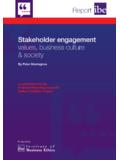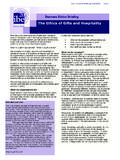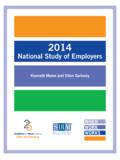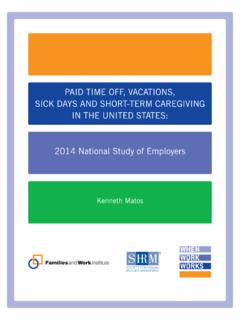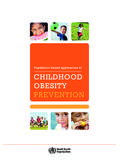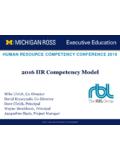Transcription of The Effectiveness of Hotlines in Detecting and …
1 The Effectiveness of Hotlines in Detecting and deterring malpractice in Organisations Nicholas Waldron September 2012 Page 1 Contents: Chapter 1 : Introduction to the Research .. 2 Reason for the Research .. 2 Aims and objectives of the study .. 2 Chapter 2 : Background .. 4 Whistleblowing legislation, regulations and guidance .. 4 What makes a good whistleblowing hotline? .. 6 Effectiveness of Hotlines .. 9 Chapter 3 : Methodology .. 14 Participants .. 14 Survey .. 14 Procedure .. 15 Chapter 4 : Findings and Analysis .. 17 Results of the survey .. 17 Cross analysis of survey results .. 30 Other tests of hotline Effectiveness .. 36 Chapter 5 : Overall Conclusions.
2 41 Outcomes .. 41 Lessons Learned .. 44 Page 2 Chapter 1 : Introduction to the Research Reason for the Research The inspiration for this research came from a post on the IIA UK/Ireland internal audit discussion forum by Guvnor Hans , an internal auditor, who said that his organisation s whistleblowing policy had been running for 2 years and there had not been a single response. He posed the question: does this mean that everything is OK inside the organisation , or that the scheme to prompt people to report wrongdoing has failed? The ensuing thread indicated that a number of other auditors had similar experiences in their organisations. Hotlines for the reporting of wrongdoing have been in the news since the 1970s, but have seen a surge in uptake since the start of the 21st century.
3 Following a number of corporate scandals in the late 1990s and early 2000s, organisations have begun to understand the potential for internal Hotlines as an early warning system to detect wrongdoing within the organisation before it spreads too far. Bad publicity associated with the external reporting of wrongdoing which has gone un noticed, un treated, or, in the worst case, has actually been accepted internally, has brought a number of major companies down. Hotlines have been introduced as part of a tool kit which help organisations to avoid such catastrophic outcomes. As the appetite for Hotlines has grown, legislation and best practice guidance extoling the benefits of Hotlines has proliferated.
4 Comprehensive benchmarking reports compare activity on Hotlines across a range of organisations and countries. Impressive statistics are available on the savings made through fraud detection following hotline introduction, and published opinions, particularly in the fraud detection and prevention community, are almost unanimous as to the benefits of Hotlines . What is missing from this hotline euphoria, however, is whether or not Hotlines are universally effective, or indeed, how to measure their Effectiveness in areas other than fraud detection. Statistics showing the effect of Hotlines on fraud detection in certain large, multi national organisations where fraud risk is greatest, are easily produced.
5 Smaller organisations on the other hand, or those which have a lower risk of fraud or those which exist in cultures where whistleblowing is not acceptable, may report that their Hotlines have received few, if any, calls during years of operation. How can Effectiveness be determined when no calls have been received? This research seeks to assess the Effectiveness of Hotlines as a detective and preventative control across the range of different types of wrongdoing in a range of organisation types and sizes and over a range of different countries and cultures. Aims and objectives of the study Whistleblowing is a broad, multi faceted subject, with a range of definitions and purposes depending on its context.
6 This study looks specifically at internal whistleblowing and more specifically at the use of Hotlines as a conduit for blowing the whistle. Hotlines are only one of a number of channels available to whistleblowers, but they are considered by many as one of the most effective channels. The aim of this survey is to determine just how effective Hotlines Page 3 are. It aims both to establish whether they are effective and if so, whether they are equally effective for all types of wrongdoing, for all types of organisation and across a range of different countries and cultures. Internal whistleblowing is by definition contained within the organisation and therefore excludes whistleblowing to external parties such as the press, parliamentary representatives, regulators, etc.
7 However, internal Hotlines are often open to external whistleblowers (for example customers or suppliers) so there is some blurring of the distinction between internal and external whistleblowing. Furthermore, Hotlines may be outsourced to a third party which operates the hotline on behalf of an organisation . Such an arrangement is considered internal for the purposes of this study as the hotline provider reports back to the organisation and ensures confidentiality of information passed to its client organisation . This study attempts to answer the questions: Are Hotlines an effective way of Detecting malpractice in its various forms (fraud, conflict of interest, harassment or other HR related incidents, inappropriate disclosure of information or security related incidents, non compliance with laws such as health and safety law and environmental law)?
8 Are Hotlines equally effective across all organisation types & sizes, and countries? Are Hotlines effective in reducing malpractice (acting as a deterrent for individuals who might otherwise have acted incorrectly)? How is the Effectiveness of a hotline measured? What factors lead to successful Hotlines ? o Do Hotlines result in changes to policy and other improvements in internal control? o Do Hotlines provide value for money is the cost of running the hotline outweighed by the savings made? Page 4 Chapter 2 : Background Whistleblowing legislation, regulations and guidance Countries which opt to introduce whistleblowing legislation or guidance must first ask themselves a number of questions: Should the implementation of whistleblowing mechanisms be mandatory or advisory?
9 How far do we want to go in protecting whistleblowers? should we allow them to remain anonymous or simply assure confidentiality? What protection should we give against retaliation? Should legislation incentivise whistleblowing by, for example, allowing for financial rewards to whistleblowers? Does existing legislation cover all or some of our requirements? What have other countries already done that we can use? What would be acceptable to our citizens while also satisfying our stakeholders at home and abroad? In answering these questions it is not surprising that a range of different legislation and guidance has resulted, and that different countries are at different stages of implementation, although it is equally unsurprising that most laws and guidance share a common core.
10 The following paragraphs give a sample of the current status of the implementation of whistleblowing legislation and guidance in place in various countries. USA The Sarbanes Oxley Act (SOX) (2002) is a comprehensive response to corporate scandals and failures which includes extensive provision for whistleblowing and whistleblower protection. Section 301 of SOX requires that the Audit Committees of publicly traded companies establish procedures for the receipt, retention and treatment of complaints regarding accounting, internal accounting controls or auditing matters, and the submission by employees of concerns regarding questionable accounting or auditing matters. Sections 806 and 1107 provide for civil and criminal penalties for companies and individuals that retaliate against employees who make whistleblowing reports.
